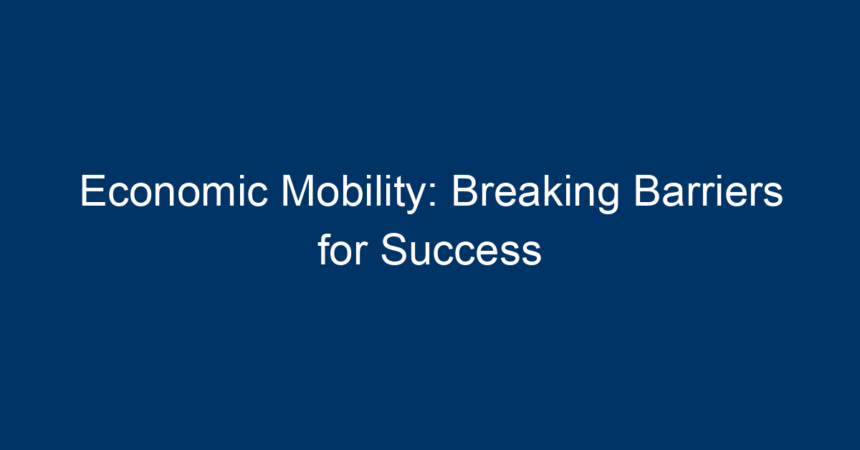In today’s rapidly changing world, the term “economic mobility” has become a pivotal topic of discussion among policymakers, economists, and everyday citizens. Defined as the ability of individuals or families to improve their economic status, economic mobility is not just an individual’s journey; it reflects the broader health of society. High levels of economic mobility indicate a thriving economy where opportunities are accessible to all, while low mobility highlights systemic barriers that hinder progress.
In this article, we will explore the significance of economic mobility, the challenges it encompasses, and actionable strategies for breaking down barriers to achieve success. Whether you are a student, professional, or entrepreneur, understanding and addressing these factors is essential for creating a brighter future.
The Importance of Economic Mobility
What is Economic Mobility?
Economic mobility refers to the capacity of individuals or families to move up or down the economic ladder over time. This can manifest itself in various forms, including:
- Intergenerational Mobility: The ability of children to achieve different economic outcomes than their parents.
- Intragenerational Mobility: Changes in an individual’s economic status during their lifetime.
High economic mobility is linked to numerous advantages, such as reduced income inequality, improved quality of life, and enhanced social cohesion. Conversely, limited economic mobility often results in persistent poverty and societal instability.
The Role of Economic Mobility in Society
The implications of economic mobility extend far beyond financial gains. Societies with high mobility tend to exhibit:
- Increased Innovation: When individuals have the chance to improve their economic status, they are more likely to pursue educational opportunities and entrepreneurial ventures.
- Stronger Communities: Economic mobility fosters a sense of belonging and collective responsibility, as people see tangible benefits from their efforts.
- Greater Political Stability: Economies that promote upward mobility can mitigate social tensions and political unrest.
Challenges to Economic Mobility
Despite its importance, several barriers hinder economic mobility. Understanding these challenges is critical for developing effective solutions.
1. Educational Inequality
Education serves as a foundational pillar for economic mobility. However, access to quality education often correlates with socio-economic status.
Key Issues:
- Disparities in Funding: Public schools in affluent areas typically receive more funding, resulting in better facilities, teachers, and resources.
- Access to Higher Education: Rising tuition costs and student debt can deter lower-income students from pursuing college degrees.
2. Systemic Racism and Discrimination
Systemic barriers linked to race, ethnicity, and gender significantly impact economic mobility.
Key Issues:
- Employment Discrimination: Studies show that minority candidates are often overlooked for jobs, even with identical qualifications.
- Pay Gap: Women and minorities frequently earn less than their counterparts for similar work, limiting their economic advancement.
3. Economic Disparities and Wealth Inequality
The growing gap between the wealthy and the poor exacerbates challenges to economic mobility.
Key Issues:
- Inheritance and Wealth Accumulation: Families with wealth have access to networks, capital, and opportunities that can perpetuate cycles of privilege.
- Access to Financial Resources: Limited access to credit and other financial services can prevent lower-income individuals from investing in education or starting businesses.
Strategies to Enhance Economic Mobility
While the challenges may seem daunting, there are several actionable strategies that individuals and communities can implement to foster economic mobility.
1. Invest in Education
Improving educational access and quality is essential for breaking barriers to economic mobility.
Actionable Steps:
- Support Local Schools: Engage with local education initiatives and advocate for equitable funding for schools in low-income areas.
- Pursue Scholarships and Financial Aid: Research scholarship opportunities and financial aid resources to make higher education accessible.
2. Foster Inclusive Work Environments
Creating a culture of inclusivity in workplaces can help level the playing field.
Actionable Steps:
- Implement Diversity Training: Organizations should invest in training programs to address unconscious bias and promote diversity.
- Establish Fair Hiring Practices: Companies can revise their hiring processes to ensure equal opportunities for all candidates.
3. Greater Access to Financial Resources
Improving access to capital and financial education can empower individuals to pursue economic opportunities.
Actionable Steps:
- Microfinance Initiatives: Participate in or support organizations that provide microloans to budding entrepreneurs from low-income backgrounds.
- Financial Literacy Programs: Engage with community organizations that offer workshops on budgeting, saving, and investing.
4. Community Support and Networks
Building strong community networks can facilitate resource-sharing and collaboration, aiding economic mobility.
Actionable Steps:
- Networking Events: Attend or organize local networking events to connect with mentors and other professionals.
- Support Local Businesses: Promote local enterprises to bolster economic growth within your community.
Conclusion: A Collaborative Approach to Economic Mobility
Economic mobility remains a critical issue that requires collective action and a commitment to equity. By addressing the systemic barriers that impede success, we can create an environment where everyone has the opportunity to thrive.
Actionable Insights for Individuals and Communities:
- Engage in Advocacy: Take part in local movements that aim to improve education, workplace diversity, and access to financial resources.
- Leverage Technology: Utilize online platforms to increase access to financial literacy and educational resources.
- Cultivate Mentorships: Seek out mentors who can provide guidance and support on your journey toward economic advancement.
By breaking down these barriers and actively promoting economic mobility, we can pave the way for a more just and prosperous society—one where success is not limited by background, but defined by determination and opportunity.




